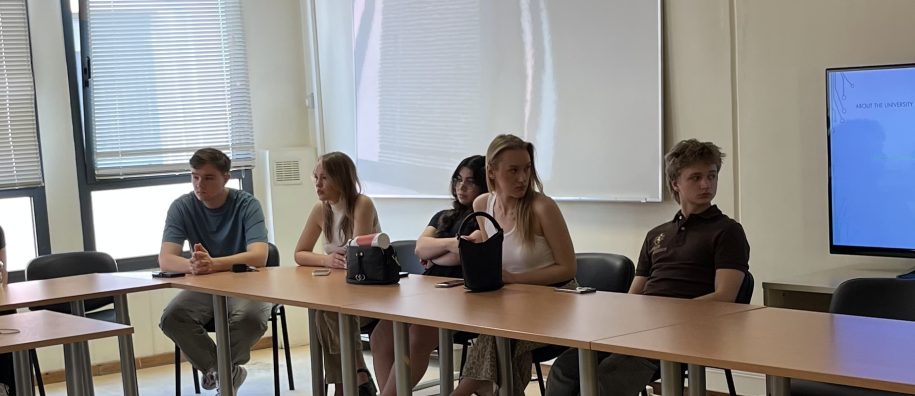
For years, students in the humanities have asked the same question: How can our studies connect to the digital, data-driven world of work? The STEM4Humanities E-Internship Programme offers an inspiring answer.
This one-month online internship connects humanities and social science students with innovative businesses and organizations across multiple countries. The goal is simple but ambitious – to give students hands-on experience applying STEM-related skills in real professional settings, while helping companies benefit from the creativity, critical thinking, and communication expertise that humanities students bring.
Where Humanities Meet Industry
Launched as part of the broader STEM4Humanities initiative, the e-internship programme reimagines what professional experience can look like for students of literature, history, philosophy, sociology, and cultural studies.
Each internship lasts four weeks and takes place entirely online – allowing students and companies to collaborate across borders using platforms like Microsoft Teams and Slack.
Up to 25 students and 5–10 business partners take part in each cycle, working together on digital communication, data analysis, content design, or creative strategy projects. Upon completion, students receive a Certificate of Completion issued by participating universities, recognizing their contribution to an international, interdisciplinary experience.
A Month of Growth: The Internship Journey
The e-internship is carefully structured to balance learning and doing, ensuring students gain real-world experience while being supported by mentors and university staff.
Week 0 – Orientation & Onboarding
Students begin with a virtual kickoff meeting, where they meet their mentors and fellow interns. They review the internship guidelines and draft personalized plans outlining their goals for the month.
Week 1 – Skill Development
During the first week, interns dive into company-provided materials and participate in one-on-one mentorship sessions. They learn about the organization’s mission, tools, and digital platforms while keeping a detailed activity log to track their progress.
Weeks 2–3 – Project Execution
The heart of the internship happens here. Students put theory into practice by working on real projects – from digital archiving and social media analytics to content strategy and data visualization. Midway through, they check in with university mentors for guidance and feedback, ensuring they stay on track.
Week 4 – Reflection & Presentation
The final week is about sharing results and reflecting on learning. Students present their projects to company teams, submit a short reflective report, and complete a satisfaction survey. Certificates are then issued to recognize their completion and achievement.
For Students: Learning to Apply STEM Skills in the Real World
The programme is open to both undergraduate and postgraduate students in the humanities or social sciences who are eager to gain professional experience. Many participants also take the STEM4Humanities MOOC before starting, which gives them a foundation in data literacy, computational thinking, and digital ethics.
During the internship, students discover how their analytical and creative strengths complement technical skills. They learn how to structure communication strategies using data insights, analyze customer or audience sentiment through basic coding and digital tools, and manage online projects collaboratively.
In short, they move from theory to practice, using their academic knowledge to solve tangible problems.
For Companies: Fresh Perspectives from the Humanities
Participating companies range from startups and NGOs to small and medium-sized enterprises. What they all share is a willingness to mentor and collaborate with students from diverse academic backgrounds.
Businesses that join the programme commit to at least two mentorship sessions and to assigning meaningful, project-based tasks. For many companies, the experience proves mutually rewarding: they gain creative insights and communication expertise, while helping shape a new generation of digital-savvy graduates.
Real Impact: What the Project Achieved
The STEM4Humanities E-Internship Programme didn’t just simulate work — it delivered measurable results. Students successfully implemented their newly acquired STEM knowledge in hands-on professional environments. They learned to translate data analysis, digital literacy, and research design into real business outcomes.
Participants reported gaining:
- Confidence in using STEM tools for communication, research, and analysis.
- Stronger teamwork and project management skills, particularly in virtual collaboration.
- A deeper understanding of how humanities skills apply in digital and commercial settings.
- Companies, in turn, praised the interns’ creativity, adaptability, and critical thinking. Many indicated they would welcome future collaborations or hire interns for extended roles.
A Bridge Between Worlds
The success of the STEM4Humanities E-Internship Programme shows that the boundaries between the sciences and the humanities are dissolving – and that’s a good thing. By bringing together academic curiosity, ethical reflection, and digital fluency, the programme creates a bridge between the classroom and the workplace.
For students, it’s a chance to see how philosophy, history, or media studies can connect to real-world innovation. For companies, it’s a reminder that the most valuable solutions often emerge where data meets human insight.
“This internship taught me that technology and the humanities aren’t opposites — they’re partners. I learned to use data to tell stories, and stories to give data meaning”, – says one internship.